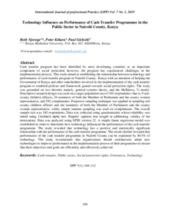Displaying 551 - 560 of 1623
This video explores Sugira Muryango: "Families Strengthening Intervention for Early Childhood Development: Alternative Delivery System of Poverty Reduction Strategies" in Rwanda—a project by the Research Program For Children and Adversity at the Boston College School of Social Work led by Salem Professor in Global Practice Theresa Betancourt.
In this blog post for Hope and Homes for Children, Stephen Ucembe writes about the damaging impacts of orphanages in the African context.
In this blog post for Hope and Homes for Children, Stephen Ucembe writes about the damaging impacts of orphanages in the African context.
This article from the Christian Science Monitor describes the Zimbabwean government's efforts to promote domestic adoption amidst "the twin crises of HIV/AIDS and a massive economic decline," which have left many children without adequate parental care, and some of the obstacles to building up domestic adoption in the country, including cultural taboos.
The purpose of this study was to establish the relationship between technology as a capacity building strategy and performance of the orphans and vulnerable children cash transfer program in Nairobi County, Kenya.
The goal of this study was to examine whether and how alternative kinship structures were reproduced in Charitable Children’s Institutions (CCIs) in Kenya.
This paper describes the development of an evidence-informed family therapy intervention designed for lay counselor delivery in low-resource settings and presents findings on the feasibility and acceptability of implementation in Kenya.
This article from UNICEF describes some of the devastating aftermath of Cyclone Idai in Zimbabwe, including the children who lost one or both parents in the natural disaster.
A pre-post design with 6–13-month follow-up assessed the feasibility and acceptability of a home-visiting intervention to promote early childhood development, improve parenting and shared decision-making, and reduce violence in impoverished Rwandan households.
Family for Every Child is looking for a Knowledge Management Coordinator to strengthen the Alliance’s capacity to transform information into knowledge, which both informs their own joint work and is used to evidence impact, and influence others.

